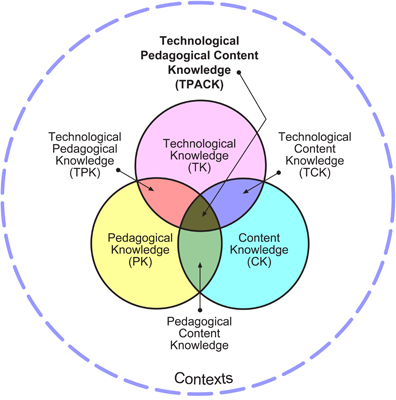Technological Pedagogical Content Knowledge, or TPACK, is a framework that describes the kinds of knowledge an educator requires in order to teach effectively in a technologically enhanced setting.

There are seven different knowledge areas in this module:
- Technology Knowledge (TK): This speaks to understanding how technology can be used in education, and can refer to introducing new technologies as well as adapting existing technologies in order to enhance teaching.
- Content Knowledge (CK): This refers to the subject-matter knowledge and educator requires to teach a subject, as well as to the understanding of educational frameworks needed to teach effectively.
- Pedagogical Knowledge (PK): This refers to the theoretical knowledge of teaching theories, models and practices needed to effectively impart learning. Note that this is insufficient on its own and must be combined with Content Knowledge.
- Pedagogical Content Knowledge (PCK): This refers to combining what you know with your understanding of the best methods to impart what you know to students. Often this can be in the form of a collaborative partnership between an instructional design expert and a knowledgeable subject-matter expert.
- Technological Content Knowledge (TCK): This speaks to understanding how to use technology to best present certain types of content. The content (and good pedagogy) should guide instructional design decisions, rather than the technology.
- Technological Pedagogical Knowledge (TPK): This refers to understanding how different technologies can enable or inhibit different teaching approaches and frameworks. Again, it is the pedagogy that should drive design decisions, rather than the desire to use “flashy” technology.
- Technological Pedagogical Content Knowledge (TPCK): This is the holistic knowledge area that educators should strive for in instructional design that speaks to the interplay between all elements of knowledge and understanding the complexity of the relationships between them.
I am in an interesting position in that I work in online education (in the design of content and learning materials) and am therefore already extremely familiar with the concept of using technology for education. However, it is important to continually ensure that this is done effectively.
There are a number of potential challenges facing the implementation of the TPACK model, specifically the technological content knowledge (TCK) domain. Specifically in my line of work we frequently see challenges in the form of stable power supplies, devices with effective working battery life, and stable internet connections when running live classes via Adobe Connect or when it comes to students having the technological ability to complete and upload assignments by the due date.
An important instructional design focus should be on matching technology to pedagogical application as well as to the content (TPACK); in other words, technology use should be formulated from the outset of the course’s design in terms of 1) whether it is suitable for the content being delivered, and 2) whether it is the best choice of delivery from a pedagogical perspective. I agree with the opinion that “technology is not an add-on but an add-in” (Kobus van Wyk, Teaching with Technology lecturer). In order to use technology effectively in teaching, educators need to ensure that the application of the technology is well thought out and planned.
Ensuring the optimal integration of content knowledge, pedagogical knowledge, and technological knowledge is important to keep in mind in my line of work, as it is often tempting to use a video or prezi for the sake of aesthetics or meeting an imaginary technology quota rather than because it is truly the best medium to use.
The student profile also needs to be taken into account when selecting technology. There always needs to be a balance when using technology; over-use, and your learners may become bewildered or you may lose touch with them; under-use, and you miss out on all the possibilities that are offered.
The future of online education will, I believe, focus more heavily on adequately preparing and supporting students to complete the course content through the mediums provided, as well as increasing the amount of personal interaction they have with each other and the course instructor.



